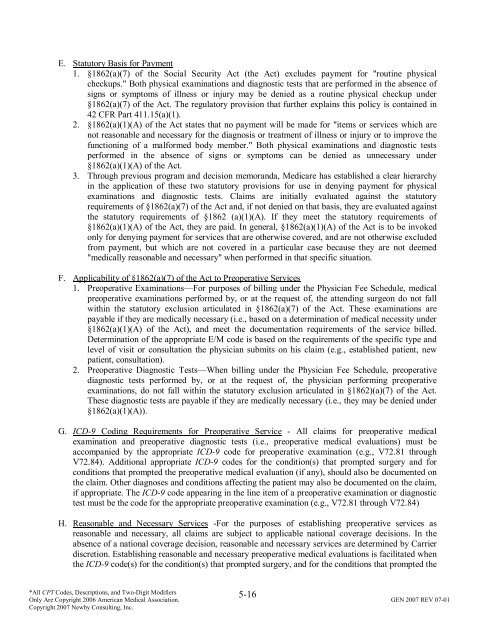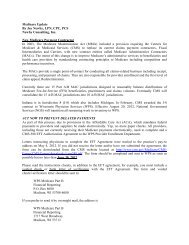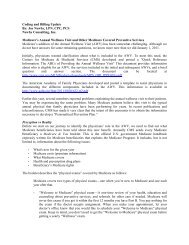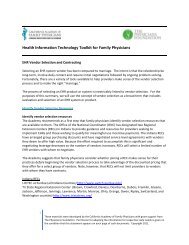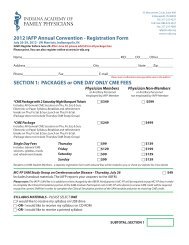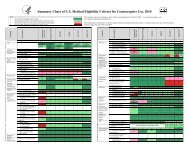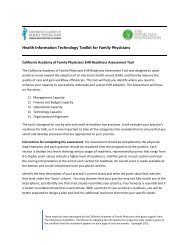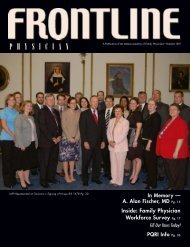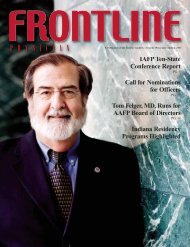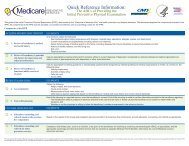pqri measure coding and reporting principles - Indiana Academy of ...
pqri measure coding and reporting principles - Indiana Academy of ...
pqri measure coding and reporting principles - Indiana Academy of ...
You also want an ePaper? Increase the reach of your titles
YUMPU automatically turns print PDFs into web optimized ePapers that Google loves.
E. Statutory Basis for Payment<br />
1. §1862(a)(7) <strong>of</strong> the Social Security Act (the Act) excludes payment for "routine physical<br />
checkups." Both physical examinations <strong>and</strong> diagnostic tests that are performed in the absence <strong>of</strong><br />
signs or symptoms <strong>of</strong> illness or injury may be denied as a routine physical checkup under<br />
§1862(a)(7) <strong>of</strong> the Act. The regulatory provision that further explains this policy is contained in<br />
42 CFR Part 411.15(a)(1).<br />
2. §1862(a)(1)(A) <strong>of</strong> the Act states that no payment will be made for "items or services which are<br />
not reasonable <strong>and</strong> necessary for the diagnosis or treatment <strong>of</strong> illness or injury or to improve the<br />
functioning <strong>of</strong> a malformed body member." Both physical examinations <strong>and</strong> diagnostic tests<br />
performed in the absence <strong>of</strong> signs or symptoms can be denied as unnecessary under<br />
§1862(a)(1)(A) <strong>of</strong> the Act.<br />
3. Through previous program <strong>and</strong> decision memor<strong>and</strong>a, Medicare has established a clear hierarchy<br />
in the application <strong>of</strong> these two statutory provisions for use in denying payment for physical<br />
examinations <strong>and</strong> diagnostic tests. Claims are initially evaluated against the statutory<br />
requirements <strong>of</strong> §1862(a)(7) <strong>of</strong> the Act <strong>and</strong>, if not denied on that basis, they are evaluated against<br />
the statutory requirements <strong>of</strong> §1862 (a)(1)(A). If they meet the statutory requirements <strong>of</strong><br />
§1862(a)(1)(A) <strong>of</strong> the Act, they are paid. In general, §1862(a)(1)(A) <strong>of</strong> the Act is to be invoked<br />
only for denying payment for services that are otherwise covered, <strong>and</strong> are not otherwise excluded<br />
from payment, but which are not covered in a particular case because they are not deemed<br />
"medically reasonable <strong>and</strong> necessary" when performed in that specific situation.<br />
F. Applicability <strong>of</strong> §1862(a)(7) <strong>of</strong> the Act to Preoperative Services<br />
1. Preoperative Examinations—For purposes <strong>of</strong> billing under the Physician Fee Schedule, medical<br />
preoperative examinations performed by, or at the request <strong>of</strong>, the attending surgeon do not fall<br />
within the statutory exclusion articulated in §1862(a)(7) <strong>of</strong> the Act. These examinations are<br />
payable if they are medically necessary (i.e., based on a determination <strong>of</strong> medical necessity under<br />
§1862(a)(1)(A) <strong>of</strong> the Act), <strong>and</strong> meet the documentation requirements <strong>of</strong> the service billed.<br />
Determination <strong>of</strong> the appropriate E/M code is based on the requirements <strong>of</strong> the specific type <strong>and</strong><br />
level <strong>of</strong> visit or consultation the physician submits on his claim (e.g., established patient, new<br />
patient, consultation).<br />
2. Preoperative Diagnostic Tests—When billing under the Physician Fee Schedule, preoperative<br />
diagnostic tests performed by, or at the request <strong>of</strong>, the physician performing preoperative<br />
examinations, do not fall within the statutory exclusion articulated in §1862)(a)(7) <strong>of</strong> the Act.<br />
These diagnostic tests are payable if they are medically necessary (i.e., they may be denied under<br />
§1862(a)(1)(A)).<br />
G. ICD-9 Coding Requirements for Preoperative Service - All claims for preoperative medical<br />
examination <strong>and</strong> preoperative diagnostic tests (i.e., preoperative medical evaluations) must be<br />
accompanied by the appropriate ICD-9 code for preoperative examination (e.g., V72.81 through<br />
V72.84). Additional appropriate ICD-9 codes for the condition(s) that prompted surgery <strong>and</strong> for<br />
conditions that prompted the preoperative medical evaluation (if any), should also be documented on<br />
the claim. Other diagnoses <strong>and</strong> conditions affecting the patient may also be documented on the claim,<br />
if appropriate. The ICD-9 code appearing in the line item <strong>of</strong> a preoperative examination or diagnostic<br />
test must be the code for the appropriate preoperative examination (e.g., V72.81 through V72.84)<br />
H. Reasonable <strong>and</strong> Necessary Services -For the purposes <strong>of</strong> establishing preoperative services as<br />
reasonable <strong>and</strong> necessary, all claims are subject to applicable national coverage decisions. In the<br />
absence <strong>of</strong> a national coverage decision, reasonable <strong>and</strong> necessary services are determined by Carrier<br />
discretion. Establishing reasonable <strong>and</strong> necessary preoperative medical evaluations is facilitated when<br />
the ICD-9 code(s) for the condition(s) that prompted surgery, <strong>and</strong> for the conditions that prompted the<br />
5-16<br />
*All CPT Codes, Descriptions, <strong>and</strong> Two-Digit Modifiers<br />
Only Are Copyright 2006 American Medical Association. GEN 2007 REV 07-01<br />
Copyright 2007 Newby Consulting, Inc.


